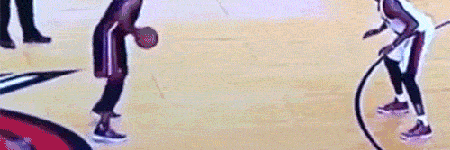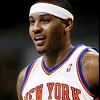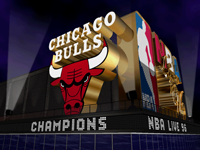http://espn.go.com/nba/story/_/id/73710 ... ve-veteran
Antonio McDyess was waived by the San Antonio Spurs on Monday, clearing a path to retirement for the 17-year NBA veteran.
McDyess indicated at the end of last season that his playing days were over, but the Spurs didn't rule out his return after the lockout ended. The move clears $2.6 million from the team payroll.
The 37-year-old spent the last two seasons in San Antonio. He was drafted second overall by Denver in 1995 and also played in Phoenix, Detroit and New York.
McDyess averaged 12 points and 7.5 rebounds in his career. He was an All-Star in 2001 and played on the 2000 Olympic team.
Spurs waive veteran Antonio McDyess.Now he retires.
8 posts
• Page 1 of 1
-

Dc311 - "F@*K YOU WHALE!!!F@*K YOU DOLPHIN!!!"

- Posts: 3473
- Joined: Wed Jun 16, 2010 1:19 am
- Location: San Antonio
Re: Spurs waive veteran Antonio McDyess.Now he retires.
Solid career but could have been a great one. He could have averaged 20/10 throughout his prime but then the injury happened. Too bad.

Enjoy! <3 Jao
-

NovU - Crap, what am I going to brag about now?
- Posts: 11325
- Joined: Tue Jun 05, 2007 6:50 pm
Re: Spurs waive veteran Antonio McDyess.Now he retires.
Another hero of my youth to retire 
-

Radioman - Posts: 1199
- Joined: Fri Oct 29, 2010 8:13 pm
- Location: Germany
Re: Spurs waive veteran Antonio McDyess.Now he retires.
No surprises there, he seemed pretty sure that he was on his way out. Shame he couldn't have picked up a ring but he had a pretty good career that was unfortunately derailed somewhat by injuries. One of my favourite players to come along in the 90s.

Contact: Email | X | Bluesky
Modding Topics: NBA 2K10 | NBA Live 08 | NBA Live 07 | NBA Live 06 | NBA 2K6 | NBA Live 2005 | NBA Live 2004 | NBA Live 96
Story Topics: NBA Live 16 | NBA 2K14 | NBA 2K13 | NBA Live 06 (Part 2) | NBA Live 06 (HOF) | NBA Live 2004 (HOF)
NLSC: Podcast | The Friday Five | Monday Tip-Off | Wayback Wednesday | Facebook | X | YouTube | Instagram | Bluesky
Donations/Support: Patreon | PayPal
-

Andrew - Retro Basketball Gamer

- Posts: 115100
- Joined: Thu Aug 22, 2002 8:51 pm
- Location: Australia
Re: Spurs waive veteran Antonio McDyess.Now he retires.
Dice was awesome. Total physical specimen before the injuries. 
R.I.P.
(retire in peace)
R.I.P.
(retire in peace)
-

Nick - Barnsketball

- Posts: 6536
- Joined: Sun Sep 15, 2002 9:01 pm
- Location: Melbourne, Australia
Re: Spurs waive veteran Antonio McDyess.Now he retires.
He was awesome; probably one of my favourite Nuggets players to come from the 90s.
2K PRO-AM: Join NLSC THRILLHO 2K-PROAM Team in NBA 2K20 (PS4)
-

Kenny - Thon Maker's Biggest Fan.

- Posts: 3688
- Joined: Thu Aug 16, 2007 7:37 pm
- Location: Brisbane, Australia
Re: Spurs waive veteran Antonio McDyess.Now he retires.
I loved Dice with Phoenix 
-

The X - is

- Posts: 11499
- Joined: Mon Nov 08, 2004 9:21 pm
- Location: Brisbane
Re: Spurs waive veteran Antonio McDyess.Now he retires.
Can never forget this McDyess story:
Also:
For McDyess -- rhymes with nice -- a country boy from Quitman, Miss. (pop. 2,736), it seems to be the only way. It is that unspoiled sweetness, that willingness to blame himself, that was at the core of the bizarre tug-of-war between the Suns and Nuggets for the free agent'sservices. But even though the Suns, his previous team, could offer him more money and a better supporting cast, the real tug was at McDyess' heartstrings.
``I didn't want to betray anyone,'' he said.''
Nuggets GM Dan Issel understood that about McDyess. McDyess, after all, had played his first two years in Denver before the Nuggets, feeling they couldn't afford him under the old collective bargaining agreement, traded him to the Suns----for draft picks.
But after the lockout, with a new agreement in place and new management -- Issel had replaced Allan Bristow -- the Nuggets pursued McDyess. And Issel, who never forgot how the Kentucky Colonels of the now- defunct ABA practically kidnapped him in 1970 until he signed with them, decided to try the same strategy with McDyess.
At first, it worked. Until McDyess, upon hearing the Nuggets were renouncing his friend, LaPhonso Ellis, to sign McDyess, canceled a press conference announcing his signing. Then McDyess -- yes, a tearful McDyess -- called the Suns' Jason Kidd and confided his doubts about Denver. At McDyess' invitation, Kidd, Rex Chapman and George McCloud flew to Denver to talk to him.
Hearing this, Issel phoned Nuggets coach Mike D'Antoni, assistant coach John Lucas and Nick Van Exel at training camp in Colorado Springs. He ordered them to return to Denver to close the deal. They came, driving 60 miles in a blinding snowstorm.
By this time, Issel, Nuggets owner Charlie Lyons and McDyess' two agents were holed up at McNichols Arena before an Avalanche game. When McDyess mentioned that goalie Patrick Roy was his favorite player, Roy was summoned, said hello, and gave McDyess the stick he had intended to use that night.
The Suns players, meanwhile, had landed. Chapman phoned McDyess' agent, Tony Dutt, on his cell phone and arranged a meeting. With time to kill, the three Suns showed up at the arena, hoping to catch McDyess as he left. A security guard told them McDyess had said, ``Beat it.''
``That was a lie,'' McDyess said. ``I never knew they were there. I'll never know what would have happened if I'd been able to speak to them that night.''
When the Nuggets delegation arrived, Van Exel spent 15 minutes alone with McDyess, persuading him to return, even though the Suns could have paid McDyess $20 million more. Despite dozens of phone calls and several stakeouts, the Suns left Denver without ever seeing or speaking to McDyess.
``All we wanted,'' Chapman said, ``was for Antonio to be happy. He's the sweetest guy in the world.''
In those 12 hours, the tug-of-war between the teams, especially the tug-of-war in McDyess' soul, was such that the sweetest guy was also the most confused.
``I didn't want to be me,'' McDyess said.
Also:
Other than those who ran the treatment center that helped Herren turn his life around, the only people mentioned in Unguarded who actually kept Herren from destroying himself were Antonio McDyess and Nick Van Exel, veterans on the Nuggets team that drafted the guard. During training camp, McDyess and Van Exel pulled Herren aside and told him that they knew all about his struggles with addiction, and that he wouldn’t be partying at all that season. Every night, he would be checking in with them, and when the Nuggets were on the road, he would be joining them for dinner instead of going out drinking.
And it apparently worked. McDyess and Van Exel did what no coach, no family member, no friend, no mentor had been able to do for Herren: they held him accountable. When the Nuggets sent Herren to the Celtics, that support system was gone and Herren reverted.
Last edited by benji on Wed Dec 21, 2011 10:36 pm, edited 1 time in total.
-

benji - Posts: 14545
- Joined: Sat Nov 16, 2002 9:09 am
8 posts
• Page 1 of 1
Who is online
Users browsing this forum: No registered users and 13 guests
